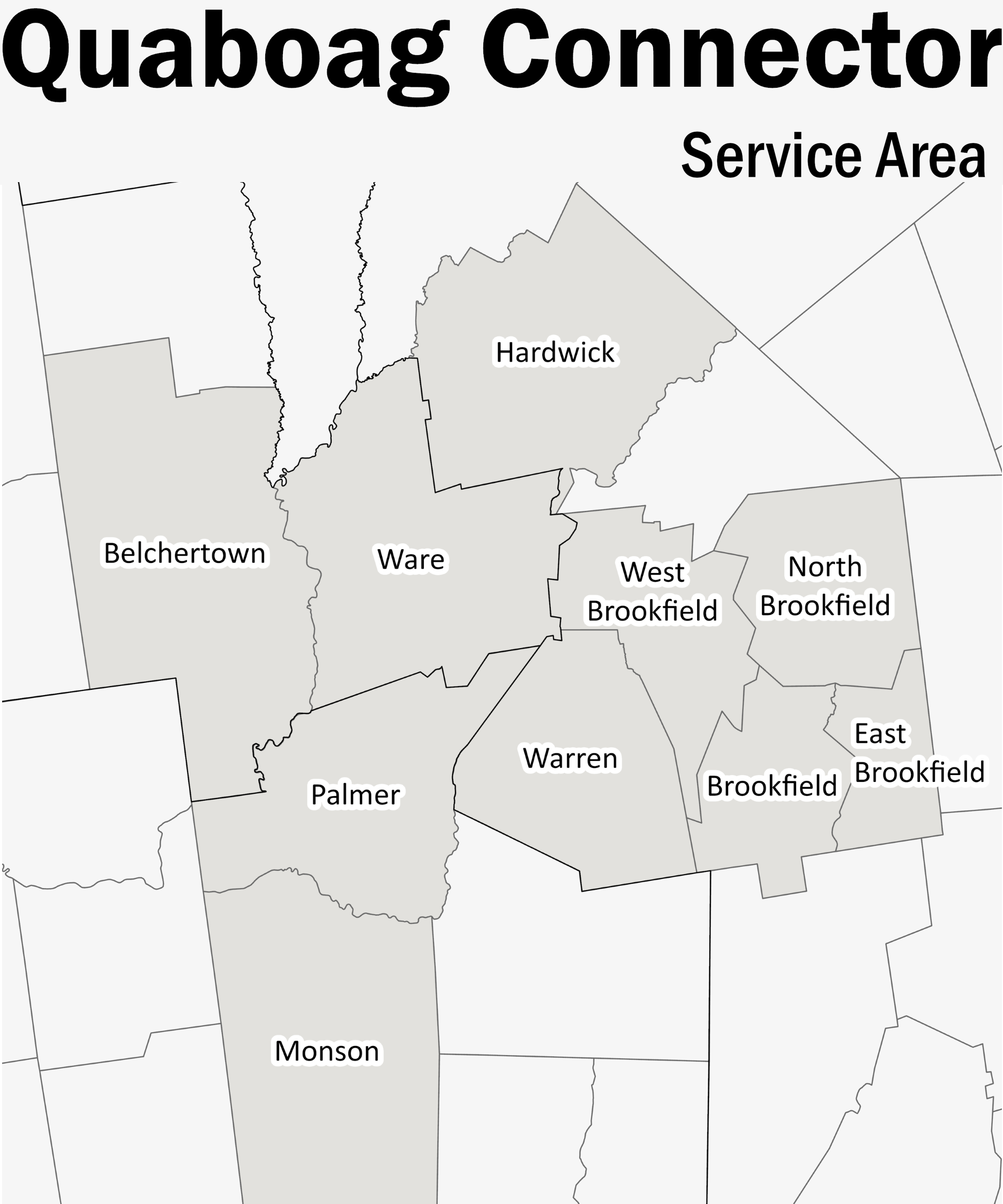Quaboag Connector Shuttle Service Drives Nearly $45 Million in Benefits and Fills Transit Gaps
Fills Transit Gaps and Providing Access to Jobs, Health Care and Social Connections in Rural Communities
 A newly released economic impact analysis conducted by the institute's Economic & Public Policy Research group and funded by The Health Foundation of Central Massachusetts reveals that the Quaboag Connector regional transportation service has resulted in nearly $45 million in total economic benefits since its launch in 2017 – underscoring the crucial role of rural microtransit in supporting jobs, health care access and economic development. For every $1 million of public and private investment in the Quaboag Connector, it has generated nearly $11 million in economic benefit in return.
A newly released economic impact analysis conducted by the institute's Economic & Public Policy Research group and funded by The Health Foundation of Central Massachusetts reveals that the Quaboag Connector regional transportation service has resulted in nearly $45 million in total economic benefits since its launch in 2017 – underscoring the crucial role of rural microtransit in supporting jobs, health care access and economic development. For every $1 million of public and private investment in the Quaboag Connector, it has generated nearly $11 million in economic benefit in return.
 In an area of Massachusetts experiencing aging populations, lower population density and higher disability rates, the Quaboag Connector creates crucial connections to essential services in 10 communities situated between Worcester and Springfield. The demand-response microtransit service has generated interest from people of all ages but primarily benefits older adults, veterans and lower-income individuals in single-person households, according to the study. The Quaboag Connector has become a lifeline in the community through rides to work as well as to important medical appointments and social connections.
In an area of Massachusetts experiencing aging populations, lower population density and higher disability rates, the Quaboag Connector creates crucial connections to essential services in 10 communities situated between Worcester and Springfield. The demand-response microtransit service has generated interest from people of all ages but primarily benefits older adults, veterans and lower-income individuals in single-person households, according to the study. The Quaboag Connector has become a lifeline in the community through rides to work as well as to important medical appointments and social connections.
“Access to reliable transportation is not just about mobility; it is about opportunity, health, and preserving the vibrancy of our communities,” said Dr. Amie Shei, President and CEO of The Health Foundation of Central Massachusetts. “As the Commonwealth considers strategies to advance regional equity, strengthen rural communities and build resiliency during difficult times, investments in rural microtransit like the Quaboag Connector offer a critical and proven path forward.”
The study shows that the public-private partnership has directly supported nearly $6 million in wages by providing thousands of work-related rides. The Quaboag Valley region is a major source of workers for both Central and Western Massachusetts. At the same time, the region has historically had a higher rate of unemployment than the state.
“With a slower pace of population and job growth than the rest of the state, the Quaboag Valley region faces mounting challenges in retaining workers and attracting new investment,” said Melissa Fales, Executive Director of the Quaboag Valley Community Development Corporation, which operates the Quaboag Connector in partnership with the Town of Ware. “This data-rich analysis demonstrates the broad impact of the Quaboag Connector. In addition to its economic benefits, the service enhances quality of life, supports health care systems, and makes the region more livable.”
In 2023 alone, the Quaboag Connector provided over 1,900 medical trips, avoiding significant health care costs from missed appointments and enabling access to preventive care – particularly vital as Mary Lane Medical Center in Ware closed that same year. The estimated annual value of these medical trips exceeds $2 million, taking into account both the financial cost of missed appointments to health care providers and improved patient outcomes from not delaying care.
The Quaboag Connector has also helped residents reduce or eliminate the need for car ownership in a region where vehicle maintenance, insurance and fuel costs have spiked. Between 2017 and 2024, the Quaboag Connector saved riders an estimated $424,000 in vehicle operating costs, traveling more than 54,000 miles annually.
The study made a series of recommendations, including:
- Developing pathways for sustainable public and private funding
- Increasing accessibility and broadening the network
- Improving connectivity across transit regions
- Sharing best practices to support development of other microtransit services in regions lacking robust public transportation
The research team analyzed data from the Quaboag Connector service area stretching across Hampshire, Hampden and Worcester counties, including the following communities: Belchertown, Brookfield, East Brookfield, Hardwick, Monson, North Brookfield, Palmer, Ware, Warren and West Brookfield.
Microtransit has gained traction as a flexible strategy to address transportation gaps across the Commonwealth. Governor Healey proposed a $10 million investment in microtransit in her major transportation funding announcement earlier this year. In the Legislature, Rep. Tricia Farley-Bouvier, Rep. Todd Smola and Sen. Julian Cyr filed “An Act establishing a special commission on microtransit” (S.2366/H.3658), which would establish a special commission to understand the current landscape of microtransit, create a shared definition with input from key stakeholders and consider funding needs and opportunities.
“The findings from the Quaboag Connector study reaffirm what we’ve heard from constituents in the region, that transportation is the linchpin to community vitality,” said Rep. Smola (R-Warren). “Reliable transit services are not luxuries – they are necessities that connect people to jobs, health care and social opportunities.”
“We need to think differently about how we support and structure transit networks across the central and western sections of our Commonwealth,” said Rep. Farley-Bouvier (D-Pittsfield). “The Quaboag Connector has clearly demonstrated that targeted, community-based transit solutions drive opportunity. Now we need to match that progress with sustained legislative attention.”
“It is very encouraging to see the Quaboag Connector delivering real, measurable value to Central Massachusetts – $45 million is not chump change,” said Sen. Cyr (D-Provincetown). “The regions of our state beyond the MBTA service area deserve a seat at the transportation table. This report is yet another example of how microtransit investments can seriously impact geographically isolated communities, and why it is time for a statewide strategy to support them.”
Transportation for Massachusetts (T4MA), a statewide coalition focused on improving Massachusetts’ transportation systems, commissioned a MassINC Polling Group poll in March, which indicates that 74% of Massachusetts residents support state funding for microtransit in communities lacking bus services.
“Access to transportation options has a significant impact on the ability for residents to pursue economic opportunities and to access health care, daily services and education,” said Reggie Ramos, Executive Director of T4MA. “This report illustrates the importance of microtransit services like the Quaboag Connector and its regional economic impact. Massachusetts needs a comprehensive approach to investing in microtransit models statewide to ensure that we expand transportation options for everyone, especially in areas where there are no alternatives.”
The UMass Donahue Institute’s qualitative and quantitative analysis included interviews with employers, health care providers and other organizations in the region. Said one respondent: “What I know about this community is that people being able to get around and get to health care, get to food, get to work … I really believe that had we not had [the Quaboag Connector] we’d be in much worse shape.”
About The Health Foundation of Central Massachusetts
The Health Foundation of Central Massachusetts is dedicated to improving the health of those who live or work in Central Massachusetts, with particular emphasis on vulnerable populations and unmet needs. Through its unique and impactful approach to grantmaking, the Health Foundation supports community-identified health issues, with health defined broadly to include social determinants of health and with a focus on promoting health equity. As a health conversion foundation launched in 1999 following the sale of the not-for-profit HMO Central Massachusetts Health Care Inc., the Health Foundation’s grants have totaled over $59 million to more than 230 unique organizations over its history. For more information, visit www.thfcm.org.
About the Quaboag Connector
Established in 2017, the Quaboag Connector is an affordable, demand-response shuttle service operated by the Quaboag Valley Community Development Corporation in partnership with the Town of Ware. The Quaboag Connector serves 10 towns in the Quaboag Valley of Central and Western Massachusetts. Since its inception, the Quaboag Connector has been informed by ongoing community input, and it has grown and evolved to meet community needs and bridge gaps in public transportation options, expanding mobility for seniors, veterans, people with disabilities, and people in need of rides to jobs and medical appointments through partnerships with local municipalities, RTAs, health care providers, and employers. For more information, visit www.rideconnector.org.
(This news item is adapted from a press release created by the project's funders.)
May 08, 2025

